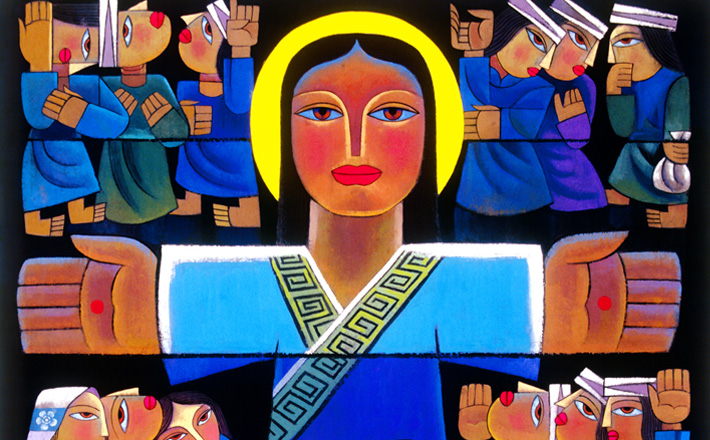Commentary on 1 Corinthians 15:19-26
“Christ is risen!”
“He is risen indeed!”
The Easter greeting and response have conveyed Christians’ joy at the resurrection since the earliest days of the Christian church. Today’s reading from 1 Corinthians stretches our Easter proclamation beyond the excitement of Easter morning, to consider that always troubling question, “So what?” What difference could that long-ago event make for us and our lives? What was the issue when Paul addressed the Corinthian believers, and what is it for us?
The Corinthians, like us, had a hard time getting their minds around the event of the resurrection. They, like many in the modern world, thought not of a “resurrection” that involved the entire person, body and spirit alike, being raised from death to everlasting life. Instead they translated that notion based on a Jewish understanding of the human being as a unified whole, into the Greek view of a body/spirit dualism. They understood that at death, those two aspects split, with the body simply decaying and the soul living on eternally. The body was scorned, in Socrates’ view, as a sōma sēma, a “body prison,” from which death gave one blessed freedom. The notion of the body itself participating in the glory of eternal life was beyond comprehension: better to be rid of it!
The Easter proclamation was translated into the affirmation that for Jesus the transition had already happened. Through our attachment to him by faith, we too can share in the same spiritual eternity, only now already, in this life. They could point to ample evidence that they were already living the spiritual life through the abundance of charismata, “spiritual gifts,” evident in their lives. What more could there be?
Paul affirmed the power of their experiences of those gifts (1:7), even while having to address the wreckage caused in the community when the gifts became a point of competition and boasting (chapters 12-14). His challenge was to help the Corinthians realize that God has yet more in store for them, beyond this life. The transformation encompassed by the term resurrection was a past event for Jesus Christ, but something still in the future for them. They could experience it only on the other side of death, just as Christ did.
Human language is stretched beyond its limits when dealing with things like resurrection. In today’s lection Paul tries to expand the elasticity of language to help the Corinthians grasp that foreign concept by using hyperbole, metaphor, and a double appeal to ancient tradition. The three literary techniques are interrelated–different doors, as it were, through which the Corinthians might enter the holy space of resurrection faith.
Verse 19 carries the hyperbole: “If for this life only we have hoped in Christ, we are of all people most to be pitied.” Clearly that would truncate the audacious claim Paul is making, namely, that through Christ our hope extends to eternity. To say that that would leave “us”–and Paul is identifying himself with the Corinthians as fellow Christians–most to be pitied is equally clearly an overstatement. It was a statement calculated to get the Corinthians’ attention, though, because that is precisely their claim and their boast. Already in this life they are fully “spiritual” people.
Paul’s second rhetorical move is into a metaphor drawn from agriculture. Christ in being raised is the precious “first fruit” of the harvest that will continue to include all believers (verse 20). The image is vivid to anyone familiar with the provisions in Torah and in many other religions that the precious first product of a crop is to be given to God or to the appropriate gods. It would even be vivid to anyone who has watched eagerly till the first berries, or tomatoes, or fruit ripens. What a treasure it will be! (But heaven help us when all of the zucchini squash ripen at once!)
The first appeal to ancient tradition takes us back to the story of God’s creation of the world, and of Adam, the first human being (verses 21-23). According to the tradition, it was by eating of the fruit of the tree of life that Adam introduced death into human reality. Just as since Adam, we all follow him into death, so also in the “new Adam”–Christ –all who belong to Christ will be made alive when Christ returns.
That lovely symmetry dissolves in an invocation of the tradition that even the resurrection is not God’s final word (verses 24-26). What comes after Christ’s return is “the end.” The Greek word telos can mean the last in a series or the terminal point, but it also means the goal or purpose toward which everything that has preceded it has been moving. In that sense the “end” of the story comes when Christ hands over to God the rule (basileia) over all the creation.
The word “kingdom,” which is so central to the teaching of Jesus as recorded in the first three Gospels, occurs seldom in the letters of Paul. Here it clearly means not a place, but the ruling authority that belongs to God. That authority can come to expression and be restored to God’s hand only after Christ has destroyed every competing “authority” and “power.” In the cosmology of Paul’s time, mediating forces were understood to have been charged with the everyday management of the creation. They are not evil in themselves, but they need to be destroyed when their “management” impedes the purposes or aims of God.
Death is the last of these powers to be conquered–after all, it has been part of the order of things almost from the beginning, as a consequence of human defiance. But in Christ’s death and resurrection, that too has at last been conquered. The celebration of Easter is the victory parade for this ultimate triumph. God’s will for life, eternal and abundant, has carried the day!
“Christ is risen!”
“He is risen indeed!”


April 4, 2010